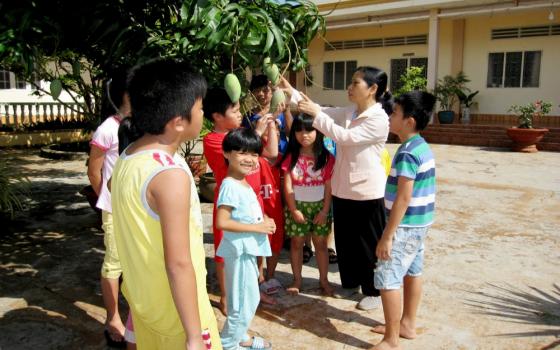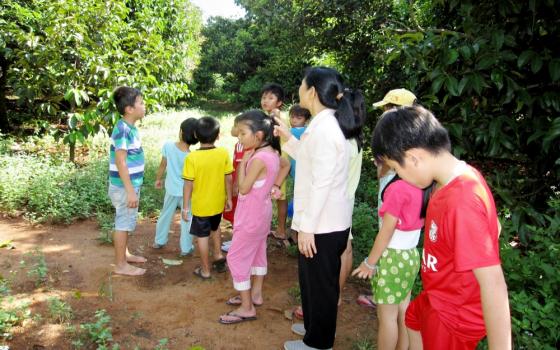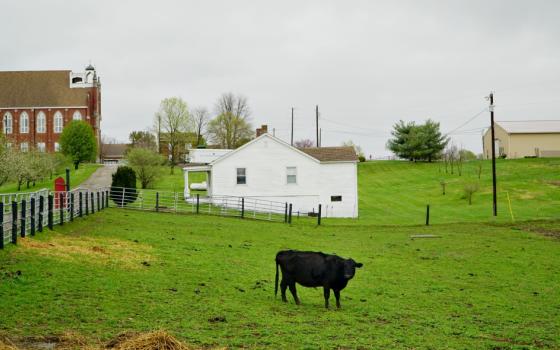Since its start three years ago, Global Sisters Report has provided a forum to "give voice" to women religious from around the world. We publish award-winning journalism about the mission and ministry of sisters, but the columns written by sisters are at GSR's heart. Now we're taking that part of our mission a step further in a new monthly feature called The Life, an international panel of 20 sisters who write short reflections on various topics. About five or so will respond to a question posed every month.
We had so many applicants that it was challenging to select the panelists for this current round. Yet we emerged from that process with what we think is truly a representation of the "global sisterhood."
On the panel are sisters who've been in religious life for decades and one who just professed first vows this month; one from India who is serving in Zambia; an American sister who's spent most of her ministry — 50 years — in the Philippines; a sister from Nigeria in the U.S.; and a sister from Nicaragua and another from Mexico who serve their communities in Rome.
Other panelists are in Australia, Canada, Vietnam, India, Kenya, Ethiopia and the Philippines. Some head congregations and others have led religious conferences involving many communities and multiple congregations. Some minister solo; others live in community.
They assist refugees, combat human trafficking, help drug addicts, teach grade school and high school, catechism and college theology courses.
For this month's question, we turned to Pope Francis and asked the sisters this question:
Two years after the release of Pope Francis' "Laudato Si', on Care for Our Common Home" how are you and/or your community carrying out Francis' call for caring for the Earth?
Mary Nguyen Thi Phuong Lan is a Dominican Sister of Our Lady of the Rosary in Vietnam. She studied in universities in Vietnam and the Philippines and has worked in formation in Vietnam.
Some parish pastors in Vietnam responded to Pope Francis by spending time before or after Mass helping Christians to understand the meaning of this encyclical letter so that they would know how to care for the common house and to better protect the environment for family, society and all of the world. Quoting Ecumenical Patriarch Bartholomew, Francis writes: "For human beings ... to destroy the biological diversity of God's creation; for human beings to degrade the integrity of the earth by causing changes in its climate, by stripping the earth of its natural forests or destroying its wetlands; for human beings to contaminate the earth's waters, its land, its air, and its life — these are sins" (Laudato Si', 8).
Communities of our congregation studied the encyclical in parishes. But each member of our congregation also has a responsibility to build the future of this planet by making the environment in her small community better and safer. One community, known as the St. Holy Family community, includes six sisters and 17 poor children who are trying to carry out the calling of Francis. It has a large garden with many different kinds of fruit trees, such as rambutans, durians, avocados, mangos, mangosteens and jackfruits.
We grow these fruit trees without using chemicals and growth substances to stimulate the fruits. We use fresh water to irrigate the plants and the dung of chickens and pigs to fertilize these trees. That is why our fruits are not bigger and nicer than the fruits that are grown using chemicals and growth substances. We are not interested in earning more money from the fruit crops; we pay attention to the health of the community.
Especially as nuns, we must realize that "our responsibility with creation, and our duty toward nature and the Creator, are an essential part of our faith," as Francis quoted Pope John Paul II. Then Francis continued: "It is good for humanity and the world at large when we believers better recognize the ecological commitments which stem from our convictions" (Laudato Si', 64).
Furthermore, it is our responsibility to educate children about the protection of all fruit trees in the garden, including not picking fruits and throwing them unconsciously onto the ground. And when they are grown, they will be aware of caring for the health of their community by not using chemicals on fruit trees and vegetables. They will also know how to protect the environment's safety and not destroy plants rashly.
Teresita Abraham is a Presentation Sister from India living in rural Zambia.
For me, Laudato Si' is a celebration of all those who pioneered the vision of a single sacred community and the motherhood of Earth. It is a wake-up call to humanity.
I feel affirmed about the direction of our congregation: Over the past two decades, our Presentation community has grown in awareness and action on behalf of the integrity of creation. With Pope Francis' timely call and challenge, we respond with urgency to the beat of our time.
We are committed to this by waking ourselves and inviting others to wake up. Our network for justice, peace and the integrity of creation has been working with sisters and co-workers to bring home the message of Laudato Si', the U.N. Sustainable Development Goals and the Paris climate agreement in a variety of ways.
Together with the local community, we have initiated a new ministry in rural Zambia by creating a sanctuary of peace and harmony called the Garden of Oneness. People are the co-creators and immediate beneficiaries of this place. It is a place to help us listen to the heartbeat of God in all of life, living the vision of mystics and teachers of our story echoed in the dream of Jesus that all may be one and in the spirit of Nano Nagle, foundress of the Presentation Sisters.
This garden is a living expression of Laudato Si': All life is sacred, all life is one. We engage in awakening programs with the local community, as well as national and international groups. We collaborate with our district council, traditional leaders and other groups in caring for our natural heritage.
We protect all indigenous trees in our 30-acre space and, during the past three years, we have planted more than 200 trees. We are grateful for the wisdom of mystics and teachers like John Muir who wrote that trees were "God's first temples." We hold a Mubanga tree in the garden as a space to honor our ancestors.
We grow our own vegetables, and other things we need we try to buy locally. We use locally made traditional drinks and do not encourage the use of any fizzy drinks. We use solar energy and hold this garden as a plastic-free zone. We discourage the use of bottled water and invite people to use living water from local springs.
During Holy Week, we integrated the wisdom of Laudato Si' into some of the programs, reflections and rituals. On Good Friday, more than 300 people took part in the Way of the Cross through the wilderness, listening to the heartbeat of the One in Jesus of Nazareth and at the heart of creation.
Pat Farrell is a member of the Dominican Sisters of San Rafael, California. She lives in the Chicago area.
Certainly, I am part of a congregation that is committed to carrying out Pope Francis' call for caring for Earth, and as executive director of the Dominican Sisters Conference, I am especially grateful for the opportunity to witness the commitment of the 19 congregations that make up that conference. It is my privilege to share from that perspective.
When the Dominican Sisters Conference met in Chicago for our 2012 convocation, we were challenged by this question: "What is Earth asking of the Dominican Order?"
So that we could study this question more deeply, our sisters across the country engaged in a process of reflection using the "Faith Praxis Cycle" to help us better understand global climate change in 2014. Our hope was that this would move us to action on behalf of Earth and God's people.
Imagine our delight when we discovered that Francis would be releasing Laudato Si'!
Spurred on by Francis' prophetic words, and knowing that the world's leaders would gather in Paris on Nov. 30, 2015, we launched — a year to the day ahead of time — a monthly study and prayer series titled "Paris 2015 and Counting." This study helped the sisters consider all the social justice issues to which they are committed in the light of climate change, and to understand that what affects Earth also affects women, migration, human trafficking, etc.
When we gathered again in Chicago for our 2015 convocation in October of that year, we not only missioned our four sister representatives to stand for us in Paris, but all of our member congregations ratified our proposal to study climate investment opportunities, with the hope of diversifying in this way.
We continued to carry out our study, prayer, reflection and action during 2016 through a study series on Laudato Si'. Our most recent work was a climate novena beginning on the eve of Earth Day 2017 and culminating on the day of the People's Climate March, April 29, which just happened to be the feast of our Dominican saint, Catherine of Siena, who had no compunction about speaking justice to those in power.
The next project on our agenda is climate change myth-busting.
Regi Joseph is a Presentation of the Blessed Virgin Mary Sister and a teacher in the state of Jammu and Kashmir in northern India
To begin with, there has been greater awakening among the Presentation Sisters about our responsibility to care for the Earth, which is our home. We strongly believe in the spirituality of being in communion with all of God's creation and are firmly resolved to care for the environment.
About Laudato Si' specifically, we as a community would regularly gather, read a particular section of the text and spend some time in reflection. Then each member shared insights. We also discussed the ways in which we can individually promote sustainable living with simple steps like minimizing waste of electricity, water and paper. We promote organic farming and refrain from using fertilizers.
In the school, a number of steps have been taken to help students become more conscious of the urgency of caring for the Earth. We have an Eco Club that creates awareness among the students through special assemblies and competitions (poster-making, slogan-writing) on caring for the environment.
Our school is a polythene-free zone; the students are not allowed to use it. They are also discouraged from using thermocol (polystyrene) and aluminum foil because these are non-biodegradable. They are asked to write a pledge stating that they will not tear or waste pages of their notebooks.
Just today, a student brought a sapling to plant in the school compound because it was her birthday. Last week, two other students brought a sapling to be planted on the school premises in memory of one of their classmates who had passed away in March. It is indeed heartening to note that the students are becoming aware of the need for planting more and more trees.
In conclusion, I would like to quote Pope Francis, speaking on World Environment Day in 2013:
"Nurturing and cherishing creation is a command God gives not only at the beginning of history, but to each of us. It is a part of his plan; it means causing the world to grow responsibly, transforming it so that it may be a garden, a habitable place for everyone."
Giselle Gómez Guillén was born in Nicaragua, entered the Society of St. Teresa of Jesus in 1975 in San Antonio, Texas, and now lives in Rome.
Two years after the publication of Laudato Si', we feel confirmed in our searches and commitments to the care and integrity of creation. At the same time, we feel challenged.
In 2005, we approved our new constitutions. One of the articles refers to our position in relation to this core theme:
We love and defend life as a gift from God and we feel responsible for the survival of our planet and the construction of a just and non-violent society. We are challenged by the ecological imbalance and the devastation of the planet, the unjust distribution of land assets and situations of violence and war. These realities urge us to live the covenant of love that God established with his creatures, manifested in the fundamental unity of the human family and in the interdependence among all and the cosmos.
We are currently preparing the next general chapter of our congregation. One of the most important issues in which we want to take a stand is integral ecology.
This option implies:
- Recreating the contemplative dimension of our Teresian spirituality: The entire material universe is a language of love of God, of his affection without measure for us. The sun, the water and the mountains: Everything is the caress of God. At the same time, it means to unite us to creation because it groans with childbirth pangs before the destruction and degradation that we humans cause.
- Moving from a superficial way of understanding ecology to an integral ecology; one that sees the interconnectedness of environmental, economic, political, social, cultural and ethical issues. Such an ecology requires the vision to think about comprehensive solutions to what is both an environmental and a human crisis.
- Defend and promote human rights and an integral ecology in collaboration with many others who seek to restore justice and the integrity of creation.
- Support the projects and commitments of our congregation in areas of special relevance for the environmental future.
- Promote mission projects for more sustainable lifestyles. Incorporate ecological and care ethics (for people, the environment and social justice) into educational projects in all areas of mission in order to help grow solidarity, responsibility and care based on compassion.
- Join as a congregation the global movement for the care of creation, participating in networks and collective actions to care for and defend water, the environment, biodiversity, energy sources and non-renewable materials.






